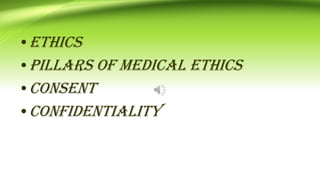Ethics in Primary Care.pdf
- 1. âĒETHICS âĒPILLARS OF MEDICAL ETHICS âĒCONSENT âĒCONFIDENTIALITY
- 2. ETHICS literally it means moral principles that govern a person's behaviour or the conducting of an activity.
- 3. Medical Practice: âĒ successful medical practice requires a relationship of trust between doctor and patient. âĒ The code of medical ethics provides a suitable framework defining this relationship in professional, social and legal contexts. â This includes the expectation that: â Patients will be consulted about decisions bearing on their treatment. â They will be informed about their illness. â They will be informed about the likely outcome of any treatment offered. â The right to confidentiality will be respected.
- 4. Medical Practice âĒ capacity of a patient to take part in clinical descision making should never be underestimated. âĒ always assume that a patient is able fully to understand the nature of medical problem and its implications, whatever their education level.
- 5. 5
- 6. Autonomy: âĒ The fundamental concept under medical ethic is autonomy of patient. âĒ This means that patient has the right to decide his or her own medical destiny. âĒ seeking consent for medical interventions, for research and for teaching. âĒ only in case of minor or mentally disturbed person consent may be sought from the patient's lawful parents or guardians.
- 7. BENEFICENCE 7 All healthcare providers must strive to improve their patientâs health, to do the most good for the patient in every situation. But what is good for one patient may not be good for another, so each situation should be considered individually.
- 8. NONMALEFICENCE 8 âFirst, do no harmâ is the bedrock of medical ethics. In every situation, healthcare providers should avoid causing harm to their patients. You should also be aware of the doctrine of double effect, where a treatment intended for good unintentionally causes harm. This doctrine helps you make difficult decisions about whether actions with double effects can be undertaken.
- 9. JUSTICE 9 The fourth principle demands that you should try to be as fair as possible when offering treatments to patients and allocating scarce medical resources. You should be able to justify your actions in every situation.
- 10. Consent: âĒ patient's consent should be sought for any treatment. âĒ for a patient to give consent, sufficient accurate information about the illness must be given to enable them to decide whether the proposed treatment is both acceptable and in their own interest.
- 11. Requirements on the doctor discussing an intervention with a patient. 1 The procedure must be described. 2 Information about the risks and complications should be given. 3 Associated risks from anaesthesia and drugs be explained. 4 Alternative medical or surgical options should be discussed.
- 12. setting the scene. âĒ Arrange a suitable quiet and pleasant environment for discussion. âĒ The place should be free of interruptions. âĒ Make time for discussion. (do not be in hurry) âĒ Use simple language that patient can understand. âĒ If necessary and with patient's permission involve relatives. âĒ If there is a language problem arrange for interpreter. âĒ At the end of discussion check that patient has understood.
- 13. legal requirements for consent: âĒ 1 patient must be mentally and legally competent to give consent. âĒ 2 the patient must have been sufficiently well informed to be able to give consent. âĒ 3 consent must have been given voluntarily, and not under duress.
- 14. Confidentiality: âĒ All aspects of medical consultation are confidential. âĒ Situations in which confidentiality can be relaxed are: âwhen patient or his/her legal adviser allow it. âWhen it is in patient's interest. âif there is an overriding duty to society as a whole. âin case of statutory disclosure.














